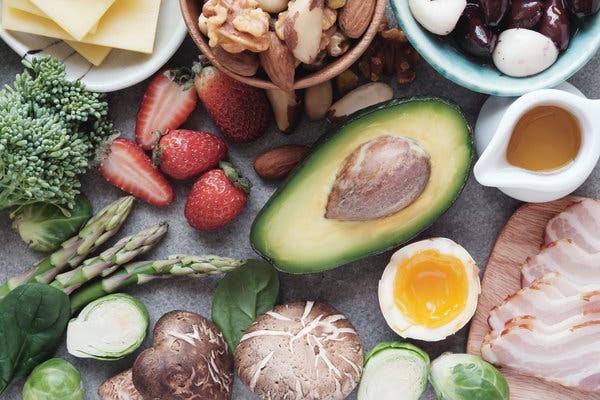The keto diet is a moderate-protein, high-fat, and extremely low-carb diet. The reduction of carbs puts the body into a state of ketosis. It’s when the body begins to break down stored fats into ketone bodies used for energy. If you’re interested in adopting the keto diet to lose weight, you have to know what foods you should eat and avoid.
Foods Allowed on the Keto Diet
Seafood, fish, poultry, eggs, avocados, cheese, non-starchy vegetables, nuts and seeds, berries, dark chocolate, unsweetened tea and coffee, cottage cheese, and plain Greek yogurt are examples of low-carb foods that you can eat when you’re on a keto diet.
Fish is packed with B vitamins, selenium, potassium, and protein. It’s carb-free as well. Fatty fish such as salmon, mackerel, sardines, and albacore tuna are rich in omega-3 fats, which can help improve insulin sensitivity and lower blood sugar levels. Try to eat at least two 3 oz. servings of fatty fish every week.
Non-starchy vegetables are packed with vitamin C and antioxidants that protect cells against free radicals. They are low in carbs and calories as well. Try to consume non-starchy veggies with less than eight grams of net carbs per cup. Cauliflower, broccoli, spinach, zucchini, green beans, and bell peppers are examples of non-starchy vegetables.
Avocados contain heart-healthy fats such as monounsaturated fat. It’s also high in potassium. You can replace animal fats with plant fats such as avocados to help improve your triglyceride and cholesterol levels.
Cheese is rich in calcium, protein, and fat. It has zero carbs as well. Cottage cheese and plain Greek yogurt are also high in calcium and protein. Five ounces of cottage cheese contains eighteen grams of protein and five grams of carbs. The same amount of Greek yogurt has twelve grams of protein and five grams of carbs. Both protein and calcium can promote fullness and reduce appetite.
Meat contains lean protein, so you should include it in your diet. Fresh poultry and meat contain no carbs. They are also high in B vitamins, potassium, zinc, and selenium. Processed meats such as sausage and bacon are allowed on the keto diet, but they are not good for the heart. They may also increase your risk of certain cancers, so limit your intake of processed meats and eat fish, beef, and chicken more often.
Eggs are also a good addition to your diet because they are rich in B vitamins, protein, and minerals. Two eggs contain twelve grams of protein and zero carbs. Eggs can also help maintain your blood sugar levels and keep you feeling full for longer. They are also rich in antioxidants like zeaxanthin and lutein, which help provide eye protection.
Unsweetened tea and coffee are allowed on the keto diet as well. Tea has less caffeine compared to coffee. It is rich in antioxidants as well. Drinking tea may help you lose weight, boost the immune system and lower the risk of stroke and heart attack.
Foods Not Allowed on the Keto Diet
No food is off-limits on the ketogenic diet. It is about carb intake and how you spend those carbs. In general, you should take less than forty grams of carbs every day. However, the amount of carbs required to achieve ketosis varies from one person to another. If you are active, you can consume more carbs. However, you should limit your intake of high-carb foods when you’re on a keto diet.
Starchy vegetables such as corn, beets, potatoes, and sweet potatoes are high in digestible carbs, so they must be limited to the keto diet. You should also limit your intake of high-sugar fruits because they are high in carbs. High-sugar fruits include bananas, mangoes, pears, and dates.
Sweetened yogurts and fruit juices should be limited as well. Avoid various kinds of sugar such as honey and maple syrup because they are high in carbs. Crackers and chips are also packed with carbs and low in fiber. Gluten-free baked goods are high in carbs, too and usually lack fiber.
The keto diet is not for everyone. That’s why you should talk to your doctor or dietician before switching to the keto diet. Your dietician can help you make a plan that will provide your body with essential nutrients and allow it to achieve and maintain ketosis at the same time.

